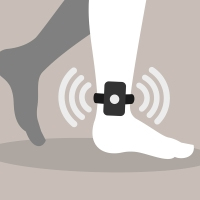Federal prisons have been fast-tracking inmate assessments for home confinement, but what if where they call home is in a rental unit? Do your renters have to tell you if their new roommate is under house arrest? Will the background report pick up on that? As you grapple with these crazy times, we’ve answered all your burning questions about renter home confinement, evictions, and the future of tenant screening.
Quick Links:
- Federal Home Confinements Amid COVID-19: The Gist
- What is the Federal Bureau of Prisons (BOP)?
- What is Home Confinement, and is it different than House Arrest?
- Can Someone on House Arrest Live in Rental Housing?
- What Requirements Does the Tenant Have to Alert You About Bringing in a Home Confinement Roommate or Family Member?
- Do I Have to Notify Other Renters or Neighbors A Person on Home Confinement is Residing on the Property?
- How do I Handle Evictions with a Renter on House Arrest?
- Can I Background Screen Those on Home Confinement Seeking to Rent or Be Added to an Existing Lease?
- Will I Be Able to See that an Applicant is Serving via Home Confinement on their Tenant Screening Report?
- Will Federal Home Confinement Transfers Affect Tenant Screening in the Future?
Federal Home Confinements Amid COVID-19: The Gist
Concerned major outbreaks of coronavirus might spread amongst our federally incarcerated, U.S. Attorney General Bill Barr has ordered the Bureau of Prisons’ (BOP) to migrate vulnerable inmates out of facilities and into home confinement. Every prisoner will be assessed based on factors like how vulnerable the inmate is to the virus, violations and violent or gang-related activities in prison, and public safety. Before transferring to home confinement, inmates will be under a 14-day quarantine.
You can read our full, in-depth article into home confinement qualifications here.
What is the BOP?
Led by Michael Carvajal, the Federal Bureau of Prisons (or BOP) governs federal complexes (contracting with some private prisons as well). Presently, the BOP oversees 173,685 inmates, has a 34% rate of recidivism, and 36,530 employees. On April 5th, the BOP reported they had already increased home confinement “by over 40% since March.”
What is Home Confinement?
Home confinement (also commonly referred to as house arrest) enables those convicted to serve out their sentence at their home or a halfway house. It’s a judicially or administratively imposed condition that requires the person to remain in their residence for any portion of the day.
Typically, those subject to release have a location monitoring device (commonly referred to as an ankle monitor or bracelet) or are supervised, however, the Attorney General authorized in his latest memo to “transfer inmates to home confinement even if electronic monitoring is not available, so long as the BOP determines… that doing so is appropriate and consistent with our obligation to protect public safety.”
Home confinement also is generally issued for 60 to 180 days if on parole. According to Politico, inmates were previously eligible for home confinement after they completed 90% of their sentences. However, with the pandemic growing every day, the Attorney General pushes for earlier, expedited migrations to home confinement for older, vulnerable inmates.
Can Someone on House Arrest Live in Rental Housing?
Yes! The person on house arrest (or the family members they’re staying with) do not need to own the home in order to carry out their sentence.

What Requirements Does the Renter Have to Alert You About Bringing in a Home Confinement Roommate or Family Member?
This is where it starts getting tricky, so you’ll want to consult legal guidance before taking action. However, all renters are bound by the terms of their lease. If someone who was granted home confinement during this time resides with a friend or family member who is renting, they’d fall under any provisions in your rental agreement that dictates when someone is no longer a guest and needs to be added to the lease. Depending on the terms in your rental agreement, if a renter fails to add someone to the lease within the specified timeframe, they would be violating their rental agreement.
If you’re concerned about your current lease agreements, talk to a lawyer about potentially adding a lease addendum.
Do I Have to Notify Other Renters or Neighbors a Person on Home Confinement is Residing on the Property?

This is one where you’ll need to tread carefully and seek legal advice. On one hand, you do have some legal responsibilities in regards to your renters’ safety – so you could be liable if a crime occurs on the property. On the other hand, there are strict renter privacy laws in place and you might not want to alarm your community and scare away potential lease renewals.
How do I Handle Evictions with a Renter on House Arrest?
During the coronavirus pandemic, you might have to wait to evict someone. Many cities and states have some sort of eviction moratorium in place during the pandemic, so whether your renter doesn’t pay rent or violates the lease by adding an extra roommate without your consent, you’ll probably have to sit tight.
Keep in mind that even under normal circumstances, you’d need to be aware of your state and local eviction laws. Unfortunately, the eviction process is not always straight-forward as some areas have “just cause” eviction laws, differing notice requirements, and more. Plus, although former criminals are not a protected class (yet), it’d be a bad idea to evict someone solely because of their time behind bars. After all, no one wants to be the poster child for that discrimination lawsuit. Treat all your renters equally – evicting in cases like nonpayment of rent, illegal activity on the premises, lease violations, and so on.
Can I Background Screen Those on Home Confinement Seeking to Rent or Be Added to an Existing Lease?
You should always screen your applicants and lease add-ons – so yes!
That being said, keep in mind that some areas have strict laws dictating when you request a background check and what you can and cannot consider in your decision to rent on the criminal report. For example, Cook County, Illinois only lets you consider that past 3 years of convictions. The city of Seattle completely prohibits obtaining criminal record information (criminal reports) other than information on the sex offender registry. Some areas also require you to extend a conditional offer of acceptance to the applicant before screening.
Will I Be Able to See that an Applicant is Serving via Home Confinement on their Tenant Screening Report?
The short answer is no. While it’s always possible the clerk entering the applicant’s conviction might add that information, it’s highly improbable (aka, we’ve never seen it). If your applicant’s tenant screening report comes back with a criminal record, you’ll see the conviction and the sentence time.
You want your leasing criteria to be as standardized as possible to avoid potential liabilities and discrimination claims – so as long as you vet all your applicants equally using a background report to objectively base your decision (and adhering to state and local laws), you’ll be fine.


The short answer is no. While it’s always possible the clerk entering the applicant’s conviction might add that information, it’s highly improbable (aka, we’ve never seen it). If your applicant’s tenant screening report comes back with a criminal record, you’ll see the conviction and the sentence time.
You want your leasing criteria to be as standardized as possible to avoid potential liabilities and discrimination claims – so as long as you vet all your applicants equally using a background report to objectively base your decision (and adhering to state and local laws), you’ll be fine.
Will Home Confinement Transfers Affect Tenant Screening in the Future?
As you can see above, many local areas have already restricted the use of criminal records when making housing decisions – and it’s likely those efforts will not only continue but get more intense post COVID-19. While it’s uncertain if federal inmates will be the driving force towards stricter screening, the early release of inmates state-wide will definitely rev up efforts.
Prior criminals are not currently a protected class, but that doesn’t mean you should freely discriminate against them. Not only does it raise ethical issues and puts the objectivity of your written leasing standards into question, but it doesn’t seem like gaining that protected status is too far off in the future.
Before taking any action towards an applicant or renter under home confinement or the renters hosting them, consult legal advice. In these difficult and confusing times, it’s important to be aware, take precautions and stay safe.










2 Replies to “What to Do if your Applicant is Under House Arrest”
If you are required to have a lease signed between you and the landlord in order to be on an ankle monitor, do they call and check to see if the landlord approved?
Hi D – This sounds like a question that would be pretty specific to your state and situation. Unfortunately we’re unable to provide any specific guidance beyond contacting the legal bodies that might be providing oversight for this situation.